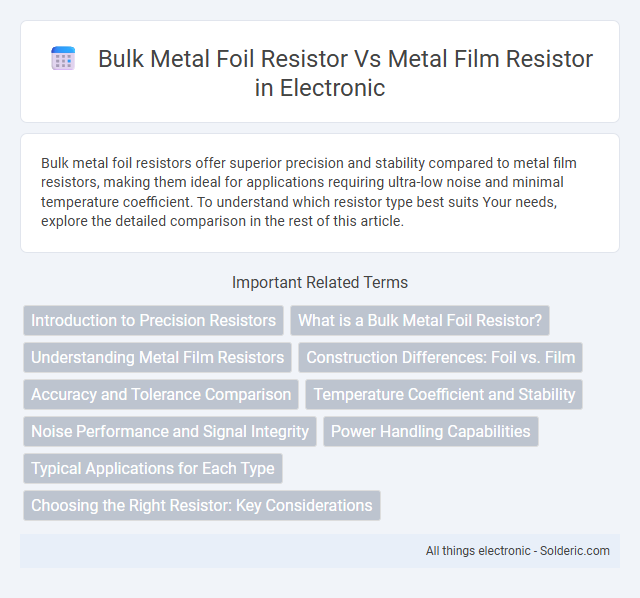Bulk metal foil resistors offer superior precision and stability compared to metal film resistors, making them ideal for applications requiring ultra-low noise and minimal temperature coefficient. To understand which resistor type best suits Your needs, explore the detailed comparison in the rest of this article.
Comparison Table
| Feature | Bulk Metal Foil Resistor | Metal Film Resistor |
|---|---|---|
| Construction | Thin metal foil bonded to ceramic substrate | Thin metal film deposited on ceramic rod |
| Tolerance | +-0.01% to +-0.1% | +-0.1% to +-1% |
| Temperature Coefficient (TCR) | +-2 ppm/degC to +-5 ppm/degC | +-50 ppm/degC to +-100 ppm/degC |
| Noise Level | Extremely low noise | Low noise |
| Power Rating | Up to 5W typical | Up to 0.5W typical |
| Stability | Exceptional long-term stability | Good stability |
| Applications | Precision measurement, instrumentation, aerospace | General purpose, audio circuits |
| Cost | Higher cost | Lower cost |
Introduction to Precision Resistors
Bulk metal foil resistors offer superior precision and stability compared to metal film resistors due to their unique construction, which minimizes temperature coefficient and noise. Metal film resistors provide good accuracy and are cost-effective but typically exhibit higher tolerance and increased drift under thermal stress. For applications demanding ultra-precise resistance and long-term reliability, your choice should lean towards bulk metal foil resistors to ensure optimal performance.
What is a Bulk Metal Foil Resistor?
A Bulk Metal Foil Resistor is a precision resistor made from a thin metal foil bonded to a ceramic substrate, offering superior accuracy and stability compared to metal film resistors. Unlike metal film resistors that use a deposited metal layer, bulk metal foil resistors provide lower noise, minimal temperature coefficients, and exceptional long-term performance. Your choice of Bulk Metal Foil Resistor ensures high precision and reliability in demanding electronic applications requiring tight tolerance and stability.
Understanding Metal Film Resistors
Metal film resistors offer precise resistance values and excellent temperature stability due to their thin metal oxide film construction, making them ideal for high-accuracy applications. Bulk metal foil resistors provide superior tolerance and low noise by utilizing a metal foil element, which results in enhanced performance under varying environmental conditions. Understanding metal film resistors helps you select components suited for reliable, consistent circuit functionality where precision is critical.
Construction Differences: Foil vs. Film
Bulk metal foil resistors feature a thin metal foil element bonded to a ceramic substrate, ensuring exceptional stability and low temperature coefficient, while metal film resistors use a thin metal oxide film deposited on a ceramic base, providing moderate stability and precision. The foil construction offers superior mechanical robustness and lower noise due to its uniform current distribution compared to the granular structure of metal film resistors. When selecting a resistor for precision applications, understanding these construction differences helps you achieve the desired accuracy and reliability.
Accuracy and Tolerance Comparison
Bulk metal foil resistors offer superior accuracy with tolerances as low as +-0.01%, making them ideal for precision applications. Metal film resistors typically have tolerances ranging from +-0.1% to +-1%, which while adequate for standard uses, lack the ultra-fine precision of metal foil types. Your choice depends on whether ultra-high accuracy and minimal temperature coefficient are critical for your circuit's performance.
Temperature Coefficient and Stability
Bulk metal foil resistors exhibit superior temperature coefficients, typically as low as +-0.2 ppm/degC, compared to metal film resistors which generally range around +-50 to +-100 ppm/degC. This improved temperature coefficient translates directly into enhanced stability under varying thermal conditions, making metal foil resistors ideal for precision applications requiring minimal resistance drift. Metal foil resistors also demonstrate excellent long-term stability with low noise, while metal film resistors may experience higher resistance changes and noise over extended periods.
Noise Performance and Signal Integrity
Bulk metal foil resistors exhibit superior noise performance with noise levels typically below 1 microvolt per volt, significantly lower than that of metal film resistors, which can generate higher excess noise due to their granular thin-film structure. The exceptional signal integrity of bulk metal foil resistors is attributed to their low temperature coefficient of resistance (TCR) and minimal inductance, ensuring stable and precise operation in sensitive analog circuits. Metal film resistors, while adequate for general purposes, cannot match the ultra-low noise floor and signal fidelity offered by metal foil technology, making the latter ideal for high-precision applications such as instrumentation and audio electronics.
Power Handling Capabilities
Bulk metal foil resistors offer superior power handling capabilities compared to metal film resistors, with typical ratings reaching up to several watts while maintaining minimal temperature coefficient of resistance (TCR). Metal film resistors usually operate efficiently at lower power levels, commonly under 1 watt, and exhibit higher noise and less stability under thermal stress. The enhanced heat dissipation and structural robustness of bulk metal foil resistors make them ideal for high-precision applications requiring stable performance under high power loads.
Typical Applications for Each Type
Bulk metal foil resistors excel in precision measurement instruments, high-frequency circuits, and aerospace applications due to their exceptional stability and low thermal noise. Metal film resistors are widely used in general-purpose electronic devices, consumer electronics, and audio equipment where moderate precision and cost-effectiveness are essential. Both types serve critical roles but are chosen based on the required tolerance, stability, and application environment.
Choosing the Right Resistor: Key Considerations
Bulk metal foil resistors offer superior precision, low noise, and excellent stability compared to metal film resistors, making them ideal for high-accuracy applications. Metal film resistors provide good performance at a lower cost, suitable for general-purpose circuits where precision is less critical. When choosing the right resistor, consider factors such as tolerance, temperature coefficient, power rating, and long-term stability to match Your specific circuit requirements.
bulk metal foil resistor vs metal film resistor Infographic

 solderic.com
solderic.com